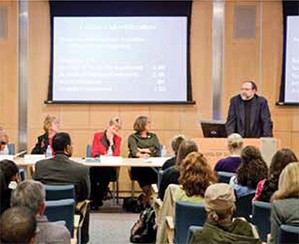
What credentials and competencies are needed for child welfare best practice? The Fauri Lecture on October 27 addressed the transformation of Michigan’s child welfare workforce.
This year’s Fauri Lecture took the form of a symposium, with two keynote speakers and a panel of presenters. Joan Zlotnik, PhD, ACSW, director of the National Association of Social Workers Foundation’s newly formed Social Work Policy Institute, spoke on social work education and child welfare practice. Carol Siemon, JD, director of the Child Welfare Training Institute, Michigan Department of Human Services, spoke on the skills and knowledge needed by child welfare workers.
Dialogues have occurred since the mid-1960s on the role of social work education and needed competencies in child welfare practice, said Zlotnik. Some issues to consider, she said, are the relevance of education and training, availability of social workers, practice outcomes, retention, attraction to the field, career ladders, and professional growth opportunities. Retention issues include work environment, levels of compensation, safety, and outsourcing of functions.
“What does it take to develop and retain a competent, committed workforce?” Zlotnik asked, citing better salaries, reasonable workload, coworker support, supervisory support, and opportunity for advancement. Studies show that retention of child welfare workers is higher if they received their education in social work with a child welfare specialization.
Carol Siemon focused on the skills that child welfare workers need. Relationship building in social work practice is important, such as working with those in other disciplines. Siemon also cited writing skills and critical thinking skills. In addition, students should focus on knowing themselves so as not to impose biases and prejudices on others. “Meet families where they’re at,” she advised. Workers will measure progress differently if they have respect for the families, a combination of compassion and pragmatism.
The panel presenters were from Michigan schools of social work. Robert Ortega, PhD, associate professor of social work at the University of Michigan, addressed the need for the child welfare workforce to have “cultural humility.” Three keys to cultural humility are (1) self-awareness, objectively appraising one’s abilities and limitations; (2) openness to new ideas and ways of knowing; and (3) transcendence, or the capacity to exceed one’s usual limits so that one can accept perspectives beyond one’s own.
Trauma-focused interventions in child welfare were the focus of the address by James Henry, PhD, professor of social work at Western Michigan University School of Social Work. The impact of trauma on children is great. When children undergo a trauma, their brains change, becoming wired for danger versus nurture. Even while trying to help a child, we can exacerbate the trauma. One of his goals is to get people to see children through a trauma lens.
Gary Anderson, PhD, LMSW, professor and director of the Michigan State University School of Social Work, focused on the role of child welfare traineeships. Traineeships encourage competent social workers; attract new, talented people to the field; and build a solid experience in students. Three challenges are making sure the education is relevant to the child welfare field, helping trainees feel they are not alone but part of a team, and providing good mentors. “The child welfare area is the most challenging and rewarding field of social work,” he concluded.
Cassandra Bowers, PhD, assistant clinical professor of social work at Wayne State University, addressed the overrepresentation of children of color in the child welfare system. Studies show that African American families are no more likely to abuse or neglect children than White families. Investing money has not improved outcomes for children of color, and usually enacting policies has not helped either. Part of Bowers’ solution is to consider our norms and values that determine who goes into care.
Kathleen Coulborn Faller, PhD, ACSW, DCSW, Marion Elizabeth Blue Professor of Children and Families and director of the Family Assessment Clinic at the University of Michigan, chaired the session.
The Fedele F. and Iris M. Fauri Memorial Lecture in Child Welfare is presented annually in recognition of former University of Michigan Dean and Vice President Fedele F. Fauri and his wife.
—Tanya C. Hart Emley is editor of Ongoing.